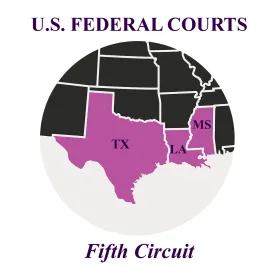Addressing protective order violations, the US Court of Appeals for the Fifth Circuit largely vacated a district court’s sanctions order. The Court explained that sanctions must comply with due process, barring parties from future litigation should be treated as a “death-penalty” sanction and damages calculations require specific factfinding. CEATS, Inc. v. TicketNetwork, Inc., Case No. 21-40705 (5th Cir. June 19, 2023) (Elrod, Haynes, Willett, JJ.)
To settle a long-running dispute, TicketNetwork licensed several patents from CEATS, a non-practicing patent assertion entity. Several years into the license, all of the licensed patents were invalidated in an unrelated litigation. TicketNetwork promptly stopped paying royalties and filed suit seeking a declaration that the license agreement was unenforceable. CEATS counterclaimed for breach of contract.
During discovery, CEATS requested TicketNetwork’s list of affiliates, which TicketNetwork refused to produce, citing its highly confidential nature. After two discovery hearings, the district court ordered TicketNetwork to produce the affiliate list but specifically prohibited CEATS from using the list for any purpose other than use in the present litigation.
At trial, a jury found that TicketNetwork breached the license, and the district court awarded attorneys’ fees and costs to CEATS. After the jury verdict, CEATS CEO Milford Skane asked his litigation consultants for a “non-confidential” list of TicketNetwork’s affiliates. The consultants gave Skane the confidential list, which was promptly used in settlement negotiations with TicketNetwork. TicketNetwork filed for sanctions, requesting damages from CEATS and an injunction preventing CEATS from suing or seeking licenses from the listed affiliates.
The district court ordered an investigation and, after two years of inquiry and an all-day evidentiary hearing, found that Skane, the consultants and CEATS all violated the protective order and were jointly and severally liable to TicketNetwork. As sanctions, the district court awarded $500,000 in attorneys’ fees (using a billing rate nearly double the one it used when calculating CEATS’s fees) and barred Skane, the consultants and CEATS from suing or seeking licenses from any of TicketNetwork’s affiliates.
The sanctioned parties appealed and argued:
-
The district court violated due process by finding Skane and the consultants personally liable without giving them notice or opportunity to respond.
-
The district court erred by barring the parties without a finding of bad faith.
-
The district court’s damages calculation was unsupported.
The Fifth Circuit began by addressing the sanctions against Skane and the litigation consultants. The Court explained that sanctions require due process, which includes both fair notice and the opportunity to defend against the claim. The Court observed that the first time Skane and the consultants were made aware that they could be sanctioned was in the sanctions order itself—and their only opportunity to defend themselves took place after that order. Given the lack of any advance notice, the Fifth Circuit concluded that due process had not been satisfied and vacated the monetary sanctions against Skane and the consultants.
The Fifth Circuit also vacated the bar preventing Skane, the consultants and CEATS from suing or seeking licenses from any of the affiliates. Core to the Fifth Circuit’s finding was that such sanctions should be considered “death-penalty” sanctions because they prevent the sanctioned parties from seeking relief in the courts. Since death-penalty sanctions require a finding of bad faith—which the district court did not make—the Fifth Circuit vacated the bar.
Finally, the Fifth Circuit vacated the district court’s damages calculation. The Court explained that damages calculations must be supported by specific factfinding. While the district court supported its damages calculation with some factfinding, it did not explain why, when calculating TicketNetwork’s fees, it used a “reasonable rate” substantially greater than the one it used for CEATS. The Fifth Circuit thus remanded the issue back to the district court for additional factfinding.




 />i
/>i

